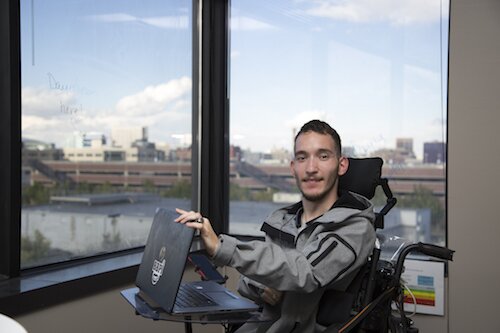Member Stephen Chavez has been making waves again — following his presentation with an SSD member at Defcon 24, he travelled to China and won an award at the GeekPwn 2016 hacking contest. And now, just after his graduation from Metro State University in Denver, he has been featured on Denver’s 9News.
Stephen and friends have been hacking his electric wheelchair with the goal to make it semi-autonomous. Unable to talk, he uses a computer keyboard to communicate; a task that cannot be done while controlling the chair’s joystick. As a result, he cannot “talk” and “walk” at the same time. With a semi-autonomous chair, he can set it to follow a friend or drive on a path while avoiding obstacles — freeing his hands to type and communicate.
Stephen’s wheel chair is a product of PGDT. The chair utilizes a proprietary protocol that runs over the same CAN interface found in all late model cars and trucks. PGDT calls the protocol R-net. R-net is deployed on the wheelchair to allow the various devices and interfaces on the vehicle to communicate with each other. There are no public documents about the R-net protocol. Stephen worked with a team of hackers to reverse-engineer this protocol and take control of the wheelchair’s internal network. “We’ve learned that power wheelchair hacking is also closely related to car hacking”

Stephen Chavez.
Photo by Sara Hertwig


 December 21st, 2016
December 21st, 2016  johnmaushammer
johnmaushammer
 Posted in
Posted in  Tags: canbus, hack, stephenchavez
Tags: canbus, hack, stephenchavez